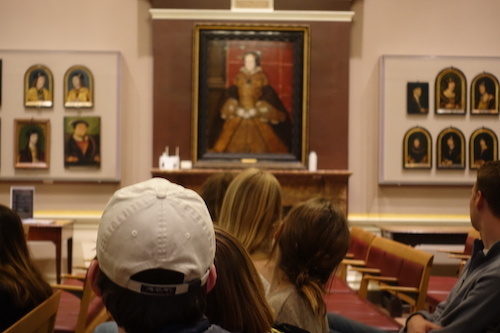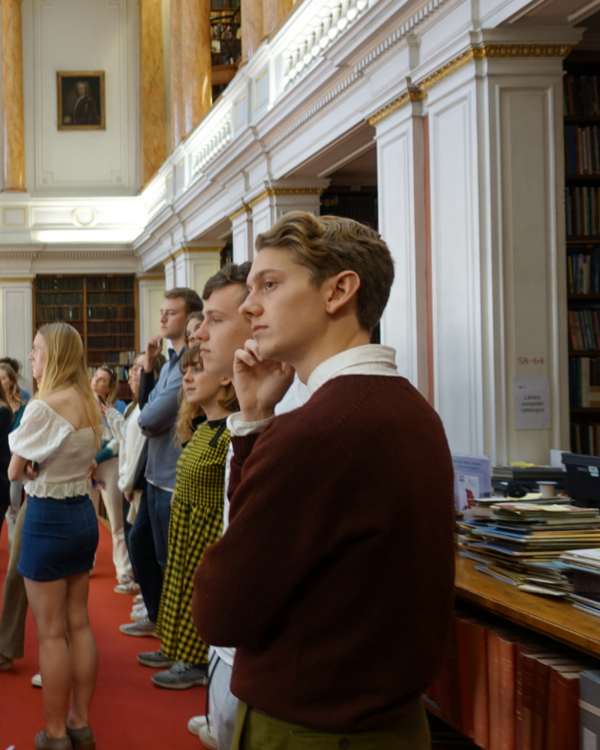Who owns the past? Notre Dame London students visit the Society of Antiquaries
Professor Fay Stevens’ Archaeology and Ethics course pushes students to look to the past to understand the present; as they explore topical debates around the ethical responsibilities of archaeologists, and pose key questions such as: who owns the past? Classroom discussions are weaved alongside visits to famous heritage sites in London and the United Kingdom, creating an immersive cultural experience for students.
Notre Dame students studying at the London Global Gateway live and study in central London, and can easily lose themselves in the city’s cultural and historic delights. One example of the many experiential learning opportunities available to students is the Archaeology and Ethics class trip to the Society of Antiquaries of London.
The society, established in 1707, is an educational charity that advocates for an understanding and appreciation of the human past. Notre Dame students on Stevens’ course were given an exclusive tour of the institution’s fascinating archival collection, led by key museum staff.

“I was expecting to see specific books, so I was surprised by how eclectic the collection was!” Remarked one student.
The collection is located in Burlington House, London’s cultural hub for the arts and society, and provided students with an exclusive inside look at the world of conservation. An experience which pushed them to apply the skills developed in their classroom to real-life situations. Upon the presentation of donated human remains (!) and culturally insensitive drawings, students were encouraged to think through the ethical issues and questions the museum must consider before displaying such sensitive items.
There is still work to be done when it comes to diversity in the heritage sector especially as archaeologists play a vital role in shaping our understanding of the past. As well as allowing students to learn more about the ethics of collections and conservation, the Society of Antiquaries of London encouraged students to think through important ethical issues, and engage in conversations about how the heritage sector is working to improve diversity.
Charles Yockey, a student on the Archaeology & Ethics course shares his reflections on what he felt was a “meaningful addition” to his study abroad experience.

“I could not wish for a more meaningful way to enhance my London experience than participating in the Archeology and Ethics course. The opportunity to experience the Society of Antiquaries was an unexpected treat that gave me unprecedented access to one of the city’s most impressive private collections and challenged me to question how the story of that history should be told. As someone interested in the real world consequences surrounding the display of material history, this experience brought focus to the different areas I've studied and made the relationship between ethics and tangible cultural heritage apparent.
At the Society of Antiquaries, I was especially intrigued by the primary documents, works of art, and manuscripts within the collection. It was especially interesting to engage with antiquary staff on the ethical questions surrounding whether these papers ought to be on public display, as they were real decision makers who have to confront the consequences of their decisions. Since their collection feels like an expansive cabinet of curiosities within a private home, I felt that my experience was more authentic and special than it would have been at a museum curated for a larger audience. The opportunity to handle artifacts myself and engage with cultural heritage firsthand was probably the most memorable part of the course thus far.
I’ve found my experience in the Archeology and Ethics course to be extremely rewarding. As a Program of Liberal Studies major, I’ve always been interested in multidisciplinary perspectives on issues that affect contemporary society. This course has allowed me to engage with some of the most pressing ethical problems in the fields of art history, conservation, and curation. The class has really challenged me to think about the perspectives of various stakeholders and the dynamics between groups that seek to control the narrative surrounding shared heritage.”